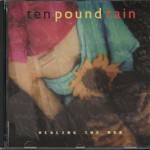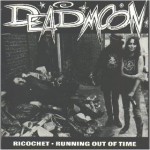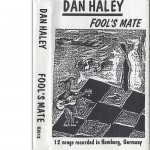 Hazel
Hazel
Wintogreen b/w King Twist
Cavity Search Records
Hazel show growth as a band on this limited edition single. “Wintogreen” smolders beneath Pete Krebs” fiery guitar work and Brady Smith’s meticulously frenetic frettage on bass. But the most powerful improvement displayed among the members of the group is the exemplary execution of drummer Jody Bleyle. Her machine-gun fills are deadly precise. Her snare drum fairly winces beneath the force of her thwacking. Bleyle’s solid back-up vocals lend Krebs distinctive support and give the band an unusual sound that sets them apart from other, similar bands.
And, apparently, everyone has been asking for a screaming car crash resolving into a load of farm animals– because that’s what you get for a couple minutes at the end of this cut.
“King Twist” features swirling guitar washes and satisfying call and response vocals between Krebs and Bleyle over a hauntingly sonorous melody line. A short, sweet cut.
As individual musicians and artists, the members of Hazel appear to be undergoing a fertile period of personal growth, which is exhibited in the maturation of their performances on this record.
 Floater
Floater
Sink
Elemental Records
BUY
Chops ahoy. Floater abound aplenty with chops and interesting new ideas or recombinations of old ones. Check out the clever audio montage that opens this opus: “The Beginning.” From this auspicious inauguration the band segue into more musically familiar turf, sounding slightly Seattlesque on “Seventeen,” where this stellar three-piece strut their formidable stuff. Drummer Pete Cornett and bassist/vocalist Rob Wynia lay a chunky slab of funked up metal beneath Dave Amador’s chainsaw guitar onslaught.
An interesting sample of a piece of Marlon Brando’s soliloquy in Apocalypse Now leads into the jungle heat of “Snowblind” wherein Rob combines elements of Ozzie Osbourne and Trent Reznor in his own apocalyptic vocal demonstration. Robs ceaselessly roiling, coiled cable of a bass riff toils like a snail slithering along the edge of a straight razor.
“Manic” lives up to its name, oscillating like a mean mood swing between the relatively pastoral sections of the lyrically bitter verses and the savage vengeance of the middle section– a spleen venting worthy of the happy NINmeister himself. “Weary” wanders in a different direction altogether. Bathed in shimmering acoustic guitars, Rob ponders the great metaphysical questions in life, rejecting the popular icons: “I’ve seen the face of God/He hates me with disinterest/Just like all the rest.” Still, when the cellos and violins enter, midway, Jimmy Page’s orchestral heyday with Zep is instantly recalled. Amador’s brilliant pentatonic-scaled arabesque of a guitar solo fuses the song with passion and a faint sense of optimism.
But the band quickly regain their incencement on “Was A Time” and march in military formation around Rob’s martial bass thrummings on “Thin Skin.” where Wynia indicates that he may have at some time listened to Henry Rollins’ hammerfisted tracts. The foreboding sound installation “Summoning” precedes the chantlike intro to the disturbing “Godgun.” The biting sarcasm of the lyric is buffeted upon a barrage of thundering guitar and bass.
The centerpiece would be the four-part mini-series “Peter The Destroyer,” which, in a certain Floydian way would be the account of a deranged psycho-killer heading down aisle K at the local Safeway with an AK-47 in his hand. Good morning Mr. Leach have you had a busy day? The delusions of squalor are heightened in the chillingly psychopathic “Kill The Girl.” Jeez maybe counseling might help. “They” continues along the same lines, turning the vantage point toward the subject of suicide and martyrdom.
And in a final poignant statement of the sheer hopelessness of it all the Floater boys conclude their set with two moody acoustic pieces: the gorgeous “Tell The Captain,” which benefits from David Loy’s piano contributions. “Out Of Sheer Loneliness” unravels like a loose ball of string before being overtaken by the distant sound of crickets chirping in the night. Or is that the sound of the coroner’s tape whirring quietly in the cold stillness of the morgue?
One thing to be sure of with Floater is that you can’t be sure where Rob Wynia is coming from exactly. And perhaps what’s most disturbing about his intelligent and probing lyrics is that Rob isn’t sure either.
The band occasionally bogs down stylistically, despite tossing innumerable sonic curveballs at the listener along the way. And while thoughtful, Rob’s lyrics are at the stage where he is identifying the source of his rage ala Reznor, but not yet scratching beneath the surface (like Greg Dulli of Afghan Whigs) of his feelings to the deeper truths.
Floater are a strong young band with a lot of talent and force of delivery. The icy violence of their vision is harsh and nearly unrelenting. But there are indications here of minds at work, attempting to construct for themselves meaning out of the chaos that is existence on this planet today. And who are we to interrupt their deliberations and ministrations?
 Ten Pound Rain
Ten Pound Rain
Healing The Mud
Magick Records
A few years back a guy named Corey Stafford was the lead singer in a popular local band called Beauty Stab, using the name Cor E. When, subsequently, Beauty Stab broke up, Corey and his band mates sort of disappeared from view. Lately, Eddie has been seen with the reformed Josephines Ocean, Courtney with The Dandy Warhols, and John and Adam haven’t been seen. Nor Corey.
Till now. Corey fronts Ten Pound Rain, a band technically as gifted as the Stabbers, but stylistically– a much different band. Where Beauty Stab liked to funk-up their poppy presentations, TPR go for ballsy gut punches and a metalized sheen. The pop-song framework remains intact, here garnished with grunge and metal. As if Cheap Trick’s Robin Zander were fronting Guns and Roses.
Impeccably recorded at Apache Studios in Vancouver, guitarist Shawn Sonnenschein sounds like the riff hound from Hell on most cuts. Check out the biting crunch of the intro to “Clovis.” With tremendous restraint, Shawn removes to the background in the verses, plucking a stark arpeggio. Those arpegiated figures appear elsewhere too, as on the haunting passages he creates in the verses of “Vulva Eaze.” The alluring languor of the mood is accentuated by Patrick Young’s droopy bass lines and Thad Smith’s straight-ahead drum approach. Here Corey sounds not unlike post-Zep Plant, crooning moonily a hazy tumescent vocal. And “Sunday Song” intimates more of the same, initially, before zooming into a strong chorus worthy of Duran Duran.
But with “Problems,” the band exhibit a tougher side. Corey grinds out a gritty vocal over Shawn’s opulent overdriven guitar lattices. Young and Smith do not overplay in the rhythm section– something they easily could have chosen to do, Instead their control allows Sonnenschein the space to tear off a snarling solo of pristine clarity, which becomes a watery wah-wah freak-out by the end of that passage. A mighty piece of work. The ballads “Seasons Change” and “Pretend,” with their shiny acoustic guitars and dreamy vocals, reflect a more peaceful essence, somewhat Beatlesque–Corey trots out from time to time, the Lennon-like nasal trills, Young the bubbling basslines.
“Shine” returns to a more formidable foundation in the verses, setting the listener up for the chewy chorus. A good college radio single. It covers all the bases. Not a homerun, but a stand up triple to be sure. A lot of imagination and invention went into the creation of the tune. And it pays off big dividends, with a production of some considerable brilliance.
Sonnenschein’s gnarling drone of an extended intro, and thoughtfully developed fills are the strongest part of “Human Water.” And he peppers the energetic “Dizeaze” with a chiming hammer of a riff over Young’s driving bassline and Smith’s cut time drums. Corey covers vocal turf: from croaky chortle to tortured howl. Sonnenschein’s solo is a thing majesty. Sterling single note runs are followed by stunning slide effects in one of the finest displays by a local guitarist heard in some time. Powerful and succinct.
The final two cuts “Holy Moon” and “Red & Blue” rescind to the more laid back style the band seems to prefer. Though the production and delivery of “Red & Blue” elevate the cut considerably.
Ten Pound Rain are rock solid. They have a quality vocalist, an uniquely understated (yet abundantly punchy) rhythm section and a rocket of a guitarist. But stylistically they move around so much it’s hard to get a clear fix on a sound. While versatility is welcome in this of world pigeon holes, too much of it may dilute the gestalt. And it may well be that discriminating arrangements, skillful production and tight ensemble work mask some occasional weak material. But overall, this is a rather pleasing confection that will certainly provide enjoyment upon repeated listenings.
 Dead Moon
Dead Moon
Ricochet b/w Running Out of Time
Sympathy For The Record Industry Records
Dead Moon are a lot like a work car. There not real pretty, a little ragged in the transmission, but damn if they don’t start right up everytime and take you where you want to go. Dependable. Now, you can pick yourself up a newer and shinier model, but when it comes to reliability, you can put your money on the smoking little slant-six engine that propels Dead Moon.
And nothing has changed with this pair of tunes. Guitarist and lathemeister Fred Cole wrests up a whining banshee vocal from the depths of his tortured soul, while bassist Toody Cole and drummer Andrew Looms lay down a skittering rat rhythm over Fred’s stripped down guitar lines. Toody’s vocal support in the memorable chorus and Fred’s short, twisted guitar solo are highlights.
“Running Out Of Time” falls into Fred’s bag of anthems with the familiar comfort of an old bucket seat. A simple folk song gives way to the restless desperation of the chorus. Toody’s vocal on the second verse perfectly captures the ineffable piquancy of her tuneless girlish voice. Rather touching.
No, Dead Moon haven’t added back-up singers or a horn section. Rest easy fans. They merely have done what they’ve always done, for as long as anyone can remember. They start right up and take you where you want to go.
 Iommi Stubbs
Iommi Stubbs
Superhead
Self-Produced
Here’s a heavy hitting five song recording that readily embraces the strengths of this top-notch three-piece unit. “Rug Rat” makes judicious use of some harrowing pieces of found dialogue, perhaps culled from some Altamont talk show circa 1971, while the band mercilessly plunders a savage musical onslaught of its own. “Redd Budd” moves at a more subdued kilter, understandable owing to the subject matter. It’s a doomy, scary, freaked out piece of sludge–morbid and morose.
The jagged swirl of guitar and bass circle around the manic drum rolls of “Long Roll>Dig,” finally lodging upon a frenetic course through a strangely attractive landscape, littered with broken bits of sound bites and samples. Emotionally raw and compelling. Musically cold and precise in its lunacy. The hysterically funny interlude at the beginning of “Fortified” would seem to have been extracted from A Child’s Garden of Grass” or some such nonsense; torqued distinctly by the addition of one extraneous punch line into the sermon. The song provides a certain jangled fortification all its own, with bass in overdrive, guitar in dyna-glide and drums wobbling dexterously like a wheel with only two-lugnuts spinning sixty down the freeway of existence.
And finally, the Stubbs’ take on Roki Erickson’s “John The Lawman” simply scorches, once the fiery chunk of powerchords finally get going. But they become bored and quit about a quarter of the way through. Anyway, they tried.
Superhead is the work of three intelligent musicians who display sarcastic humor and originality in the way they assemble their aural collage. In a perfect world, Iommi Stubbs would be playing on the Letterman Show tomorrow night, blaring away under the lights, heating up that cold, cold studio.
 Dan Haley
Dan Haley
Fools Mate
Honest John Records
That the title of this recording would incorporate multiple puns seems entirely characteristic of this wayward Boat, who had to go all the way to Hamburg, Germany just to record it. Ah scenic Hamburg!
The twelve songs collected here are a combination of traditionals and covers, new arrangements of songs he did with Ed and the Boats, and new compositions all given simple treatment, acoustic guitars, occasional harp and mandolin, flute and light percussion.
“Bound To Lose” is an old Holy Modal Rounders’ song and Dan does his best Steve Webber imitation, snidely leering the lyrics like a wizened sinner and a weary saint. Haley’s “Remorse Code” is basic bluegrass fare but for one flickeringly odd transitional chord and a jocular set of lyrics based on love and electrical engineering. Dan’s rendition of the tradional folk song “House Carpenter” rings with the vigor of heartbreak, disillusionment, and a droning 12-string guitar. And his song “Shit Sandwich” gives rise to all of Dan’s songwriting talent: impassioned, eloquent lyrics; unique turns of faintly familiar melodies, and clever construction. Here he sounds faintly Dylanish but more so only like himself.
Dan’s warm raspy voice caresses ballads like “In The Cavern” and “I’ve Got A Bird,” the latter of which is a Boats tune from way back, the former of which sounds like it could be too. The gorgeous “I’ve Got A Bird” must be one of the finest songs ever written, sensitively weaving a sad parable of loss and redemption over an ethereal melody. “Slow Life” combines a wide swinging chord progression with a practical philosophy that is neither shallow nor mean-spirited, which relegates Haley to a spartan musical minority. And check out “Cut And Dry” and name anyone with a better falsetto than Dan’s. “Glory” cynically inspects the nameless fears and erratic motivations of a human being in the midst of puzzling circumstances.
Soundwise, this is a pretty lousy recording. The Germans maybe good at building cars and brewing beer, but their recording techniques have a lot in common with the console stereo i.e. they’re extinct. Still, Dan Haley’s resilient genius shines through. Here’s a guy who’s kicked around this town for fifteen years and still can get no respect from the fan base at large. And his is not the only case. Sometimes I wonder what’s wrong with Bathosville, our sunny little hometown. Didn’t anybody’s parents love them?
 Tim Otto
Tim Otto
Poetic License
Almost Paradise Records
Here’s another guy who’s been lurking around the City of Poses nearly as long as Dan Haley. Tim Otto has had a checkered career, fraught with disappointment and disillusionment on a road that took him to Nashville a couple of times and to Clovis, New Mexico to work with Norman Petty (of Buddy Holly fame), fashioning his shot at the brass ring: only to see his dream wither when Petty died.
And you wanna know how Tim feels about that? Take a listen to “I Don’t Want To Be Anything,” He lays it all out on the line quite clearly. This is a stark, yet intimate recording– just Tim on acoustic guitar and vocal, performing simple, well-crafted, country tinged folk songs.
“Stay As You Are” could easily lapse into cynicism, but escapes, in a way only Tim or Townes Van Zandt could create. “The Summer Of My Discontent” is not so kind. Tim icily enumerates the injuries his soul has endured in reaching that perilous plateau. “Naked Song” lays out Otto’s purpose in recording such a frankly personal project. “So I’ll play this naked song/ with just my voice and guitar/ so you can see through the skin and the scars/ And I know that it’s not perfect/ It’s as human as it can be/ For you see, this naked song/ It’s a lot like me.” Naked, yes, but nakedly honest as well.
“I’m Sorry” sarcastically affirms the need to be different in a world where money talks and the rest apologize. “The Dr. Said” echoes Leonard Cohen’s sinister paranoia: “And the art police came to arrest me/ for painting in yellow and blue/ They said ‘Your little art joke is up/ these colors won’t program to you'” and the horrifying chorus, “25 milligrams for you/ 25 more oughta do/25 milligrams for you.” And in “Nothing Really Matters” Tim admits that “Nothing really matters/ Not even art/It’s just junk that gets in our way/Nothing really matters/ We’re all so detached/ I’m cooler than you any day.”
And that might not be a complete idle boast on Tim Otto’s part. For he confronts his private demons with an artistic bravery of forthrightness and candor that seems out of place in a society of veiled intentions and hidden agendas. Certainly no one will like this well-recorded effort, Poetic License is much too lucid and truthful to penetrate the philosophical thicket that inhabits our busy, busy world. Which is sort of a shame. It seems like the guy has a lot to say

I guess I’m back where I started with the newly released “1983.” It’s equal parts Norman Petty sessions and some productions of my own from: Portland & Nashville. Getting very good feedback from people who hear it.
Would love to know what S.P. thinks?
Thanks, Tim Otto
I have now retired from the music business as performer at 55. We played our last gig at Music Millennium in 2014 with Chris Charles my long time back up friend and picker.
However, my catalog, Almost Paradise Music (BMI), holds over 250 songs of my creation and demoed by me for the most part: Country, Rockabilly, Surf, Rock, Folk & more!
It’s been a great 35 some odd years. I can be reached on Facebook or: apmotto2@yahoo.com. Thanks.
-Tim Otto
2016, Oregon